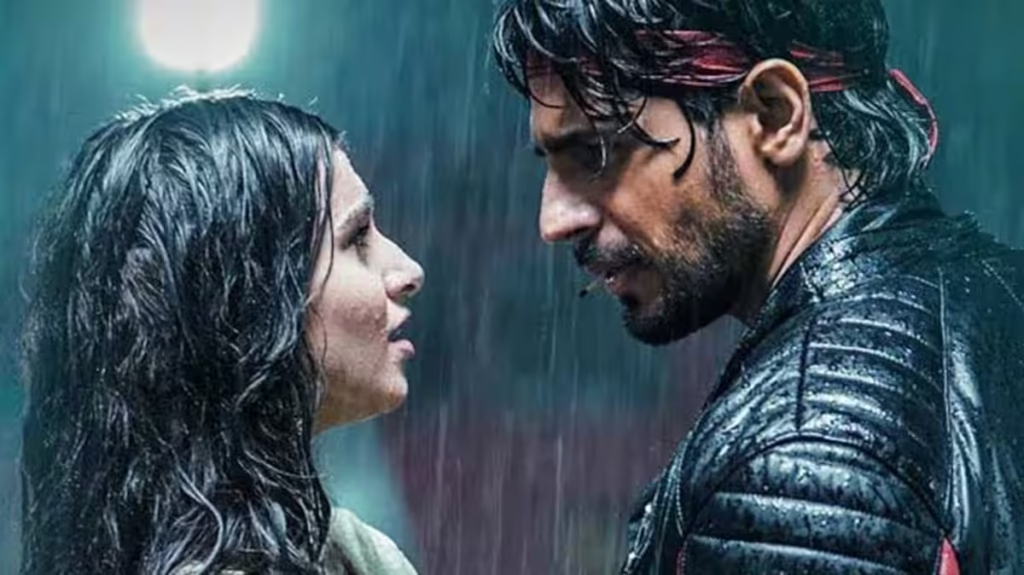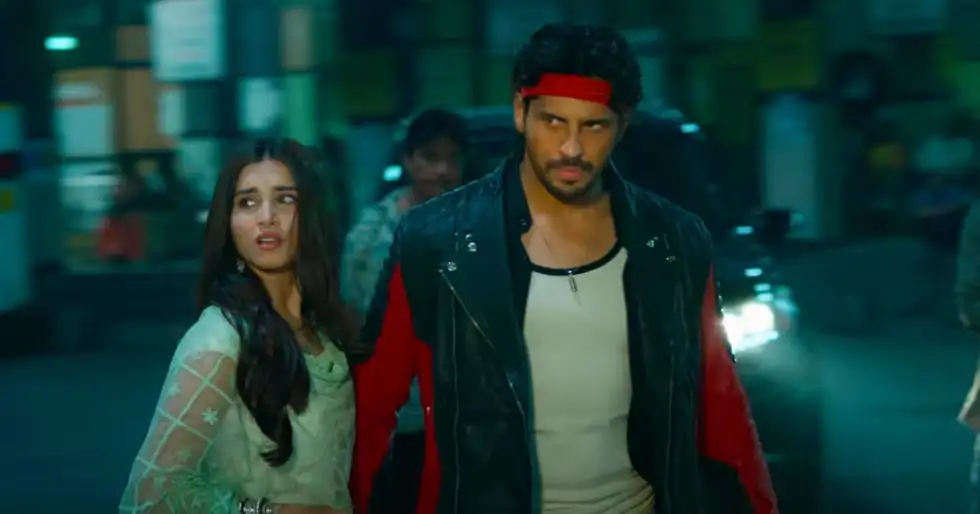Marjaavaan (2019) – A Tale of Love, Revenge, and Redemption

Introduction
Indian cinema has long been fascinated with themes of love, sacrifice, and revenge. Over the decades, audiences have embraced films that blend romance with action-packed narratives, where love often battles fate and destiny. Marjaavaan, directed by Milap Zaveri and produced by Bhushan Kumar, Divya Khosla Kumar, Krishan Kumar, and Monisha Advani, is one such modern Bollywood film that attempted to revive the melodramatic essence of 80s and 90s Bollywood — with larger-than-life heroes, intense villains, emotional romance, and fiery dialogues.
Released in November 2019, Marjaavaan stars Sidharth Malhotra, Tara Sutaria, Riteish Deshmukh, and Rakul Preet Singh. It presents a cocktail of love, sacrifice, revenge, and tragedy, all wrapped in a masala entertainer format. While the film received mixed reviews from critics, it struck a chord with certain sections of audiences who enjoy dramatic dialogues, action-packed fights, and emotionally charged love stories.
This article provides a comprehensive 3000-word deep dive into Marjaavaan — covering its plot, characters, performances, themes, music, direction, controversies, audience reception, and cultural relevance.
Background of the Film

The Director – Milap Zaveri
Known for his work in Masti and Satyameva Jayate, Milap Zaveri has always gravitated towards larger-than-life action dramas with high-voltage emotions. With Marjaavaan, he sought to bring back old-school Bollywood masala — the kind where heroes spoke in fiery one-liners, villains were unapologetically evil, and love stories ended in grand sacrifice.
Inspiration
Marjaavaan was designed as a throwback to 80s Bollywood — melodrama, poetic dialogues, exaggerated villains, and action sequences. Zaveri himself admitted he wanted to create a film that appealed to fans of emotional, dramatic cinema rather than subtle, realistic storytelling.
Plot Summary of Marjaavaan

The film unfolds in a melodramatic structure with elements of love, betrayal, and vengeance.
Act 1 – Introduction to Raghu
The story begins in the streets of Mumbai, ruled by mafia don Narayan Anna (Nassar). His trusted henchman is Raghu (Sidharth Malhotra), an orphan raised by Anna. Raghu is loyal, fearless, and respected in Anna’s gang. He grows up to be Anna’s right-hand man, executing his orders with ruthless efficiency.
However, Raghu’s loyalty brings him into conflict with Anna’s biological son Vishnu (Riteish Deshmukh). Vishnu, born with dwarfism, feels insecure and sidelined because Anna favors Raghu over him. This resentment sets the stage for their eventual rivalry.
Act 2 – Love Blossoms
Raghu’s life takes a turn when he meets Zoya (Tara Sutaria), a mute Kashmiri girl who teaches music to children. Despite her inability to speak, Zoya’s innocence, warmth, and kindness melt Raghu’s hardened heart. Their romance blossoms, symbolizing purity amidst the violence of Raghu’s world.
Zoya dreams of taking children to a music competition in Kashmir, a dream Raghu supports wholeheartedly. Their love becomes a source of hope and transformation for Raghu, who begins to imagine a life beyond crime.
Act 3 – Vishnu’s Hatred and Zoya’s Fate
Vishnu’s jealousy deepens as Raghu rises in prominence. Seeing Zoya as Raghu’s weakness, he plots to destroy her. Manipulating circumstances, Vishnu creates a situation where Raghu is forced to make an impossible choice.
In one of the film’s most dramatic twists, Raghu is compelled to shoot Zoya himself, as her secret knowledge threatens Anna’s empire. Zoya, realizing her death is inevitable, accepts her fate with dignity. Raghu’s act leaves him shattered and guilty, fueling his thirst for revenge against Vishnu.
Act 4 – Revenge and Redemption
Heartbroken and destroyed, Raghu transforms into a man seeking vengeance. The final act sees Raghu confronting Vishnu in a dramatic, action-filled climax. Raghu kills Vishnu, avenging Zoya’s death, but finds little solace.
The film ends with Raghu living with the grief of losing Zoya, emphasizing the tragic cost of love, betrayal, and violence.
Character Analysis

Raghu – Played by Sidharth Malhotra
Sidharth Malhotra portrays Raghu as a brooding, conflicted anti-hero. He is both loyal and ruthless as Anna’s henchman, yet tender and vulnerable in Zoya’s presence. His journey from a gangster to a broken lover seeking redemption is central to the film.
Critics noted that while Sidharth looked the part with his intense screen presence, his performance sometimes lacked the raw energy required for such a melodramatic role. Still, fans praised his chemistry with Tara Sutaria.
Zoya – Played by Tara Sutaria
As the mute heroine, Zoya symbolizes innocence and purity. Her character plays a pivotal role in humanizing Raghu, showing that love can transform even the most hardened souls. Tara Sutaria’s performance was praised for her expressive eyes and graceful presence, though her character was criticized for being underwritten.
Vishnu – Played by Riteish Deshmukh
Vishnu is the film’s most memorable character. Born with dwarfism, he is consumed by jealousy towards Raghu. His villainy is exaggerated but effective — cruel, insecure, and manipulative. Riteish Deshmukh embraced the negative role with gusto, making Vishnu both detestable and entertaining.
Aarzoo – Played by Rakul Preet Singh
Aarzoo, a bar dancer, is deeply in love with Raghu but knows her feelings are unreciprocated. Her character brings glamour to the film but also emotional depth. She represents unrequited love and loyalty, standing by Raghu in his darkest times.
Themes in Marjaavaan
1. Love and Sacrifice
The central theme is tragic love. Raghu and Zoya’s story mirrors classic Bollywood romances where love is doomed by circumstances and betrayal.
2. Revenge
Revenge drives the second half of the narrative, with Raghu’s quest against Vishnu becoming the emotional high point.
3. Loyalty and Betrayal
The film explores loyalty within family and crime. Raghu’s loyalty to Anna contrasts with Vishnu’s betrayal, while Zoya’s trust in Raghu ends tragically.
4. Fate and Destiny
The inevitability of tragedy — that love and happiness are fleeting in a world of crime — underscores the film’s fatalistic tone.
5. Disability and Insecurity
Through Vishnu’s character, the film touches on how physical disability can shape insecurity and resentment, though portrayed in an exaggerated cinematic style.
Direction and Cinematic Style
Milap Zaveri’s direction embraces melodrama unapologetically. With over-the-top dialogues, stylized action, and slow-motion shots, the film deliberately echoes 80s masala cinema.
- Strengths:
- Strong visuals and action choreography.
- Riteish Deshmukh’s villainous portrayal.
- Emotional appeal for audiences who enjoy melodrama.
- Weaknesses:
- Predictable storyline.
- Excessive melodrama alienated modern audiences.
- Underdeveloped female characters.
Cinematography and Visuals
The film’s visuals, shot by Nigam Bomzan, emphasize gritty Mumbai streets, dark underworld settings, and romantic moments in softer hues. Action sequences are stylized, with rain-drenched fights and slow-motion punches adding to the masala effect.
Music and Soundtrack
The soundtrack of Marjaavaan was a massive hit, even more successful than the film itself. Composers like Tanishk Bagchi, Meet Bros, Payal Dev, and others contributed.
- “Tum Hi Aana” (Jubin Nautiyal) – The soul of the film, a melancholic love song that became immensely popular.
- “Thodi Jagah” (Arijit Singh) – Another emotional number reflecting Raghu’s grief.
- “Ek Toh Kum Zindagani” (Neha Kakkar) – An item song featuring Nora Fatehi, adding glamour.
- “Kinna Sona” (Jubin Nautiyal, Dhvani Bhanushali) – A romantic melody highlighting Raghu and Zoya’s chemistry.
The soundtrack’s success ensured the film remained in public memory, especially “Tum Hi Aana,” which became a chartbuster.
Audience Reception
Critical Reviews
Critics were divided, often leaning negative:
- Positive: Praised the music, Riteish Deshmukh’s performance, and Tara Sutaria’s expressive presence.
- Negative: Called the plot outdated, dialogues too theatrical, and pacing uneven.
Box Office Performance
- Budget: Around ₹38 crore.
- Collection: Approximately ₹65 crore worldwide.
While not a blockbuster, the film was a moderate commercial success, largely due to its music and single-screen audience appeal.
Controversies
- Representation of Disability: Some critics argued that Vishnu’s character reinforced stereotypes by equating disability with villainy.
- Excessive Violence: The stylized violence drew criticism for being excessive in a romantic film.
- Overdramatic Style: Modern audiences, used to subtler storytelling, criticized the film’s melodrama.
Cultural Impact
Though not a classic, Marjaavaan contributed to Bollywood in specific ways:
- Revival of Masala Melodrama: Reintroduced audiences to old-school dramatic storytelling.
- Musical Legacy: Songs like “Tum Hi Aana” remain iconic love ballads.
- Villainy Reinvented: Riteish Deshmukh’s negative role showcased his versatility beyond comedy.
Conclusion
Marjaavaan is a film that wears its heart on its sleeve. It is unapologetically melodramatic, rooted in 80s-style masala cinema, with themes of doomed love, sacrifice, and revenge. While its predictable story and excessive theatrics limited its critical appeal, it found resonance with audiences seeking emotional intensity and powerful music.
At its core, the film is a tragic love story — one where happiness is fleeting, love is eternal, and sacrifice defines true devotion. Raghu and Zoya’s romance may have ended in tragedy, but through its songs, dialogues, and emotional intensity, Marjaavaan continues to live on in Bollywood’s memory.
In the end, Marjaavaan reminds us why melodrama still has a place in Indian cinema — because love, in all its joy and pain, never goes out of style.
